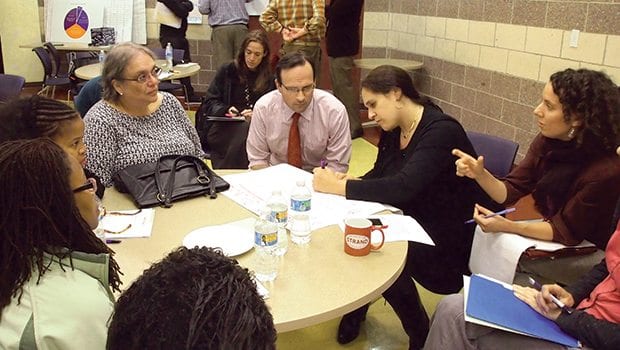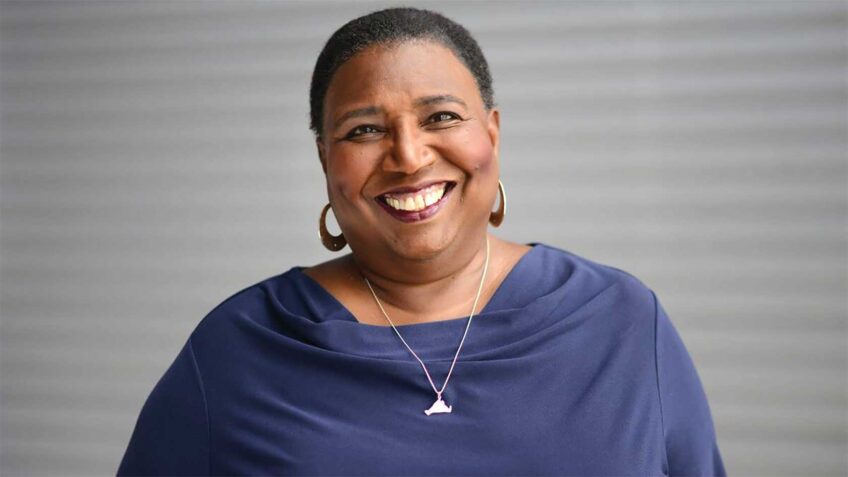
During the elementary school years, Valerie Davis’ son did well in the district school where he was assigned. But when it came time for her daughters to go to school, Davis says, none of their assignments were good enough.
“Of course they didn’t get into any of the schools I picked,” she said. “I didn’t like the school they were assigned to. I called my friends who were teachers and they said, ‘No, don’t put them there.’”
In the end, all three of her children ended up in charters and Catholic schools.
For Nicol Riley, a charter school worked well for her daughter, but for her son, who has learning disabilities, they weren’t an option.
“It hurt me so bad to see how they treated children with learning disabilities at my daughter’s charter school,” she said.
In the end, her son ended up in a district school that was able to cater to his learning style.
Davis, Riley and other parents shared their struggles and frustrations seeking school assignments as the Boston Public Schools are considering changes to the current school assignment policy that would allow parents to apply to charter and public schools with one form. The meeting, held last Thursday, was organized by the Boston Compact, an organization that facilitates cooperation between Boston Public Schools, charters and Catholic schools. BPS officials, charter school representatives and education activists joined the parents for a discussion on their experiences with the current assignment system and what they would like to see in a revamped system.
Meeting participants were asked not to discuss proposals to lift the cap on the number of new charter schools.
Because many of the parents at the meeting secured placements for their children before the school department adopted its location-based school assignment policy, some of the questions revolved around how that system works.
Until 2013, the city was divided into three zones. Parents in a zone were able to apply to any school within its borders. Charter schools and some district schools operated outside the zone system, allowing parents from anywhere in the city to apply. Admittance to all schools — charter and district — is determined by lottery.
Under the assignment policy that took effect in 2013, an algorithm that takes into account a student’s proximity to schools determines which schools students might attend. The algorithm currently in use factors in the closest tier-one schools — those in which a high proportion of students score proficient or higher on the state’s MCAS exam. As with the zone system, students are selected by lottery.
Under the proposed system, two tier-one charter schools would also be factored into the algorithm along with at least two tier-one district schools.
“The purpose of this was to not let the lines on a map dictate quality,” said Kim Rice, assistant superintendent of operations.
Parents and parent advocates pointed out that the current system does not factor in which schools are best equipped to handle English language learners and students with learning disabilities.
Rahn Dorsey, the city’s chief of education, suggested that BPS could factor in English Language Learners and students with disabilities.
“We hear that because we have students who are ELLs or SWBs, we can take shared responsibility to make sure their needs are met,” he said.
Dorsey said that ease, access and equity are the guiding principles for the proposed assignment policy.
Some of the parents at the meeting spoke about the difficulty of securing a seat in a high-performing school under the current policy. While the existing school selection algorithm takes into account access to tier 1 and tier 2 schools, it doesn’t guarantee access. Riley said some of the schools that appeared among her choices had very few or no vacancies.
“What if there’s no access at these tiers?” she asked.
Test scores and proximity aside, the most important factor in school selection is the school’s learning environment, said Adelsa Mendes, who spoke about the difficulty of determining which schools have the capacity to teach students whose primary language is Cape Verdean Creole.
“A quality school is a school that meets your needs,” she said.







